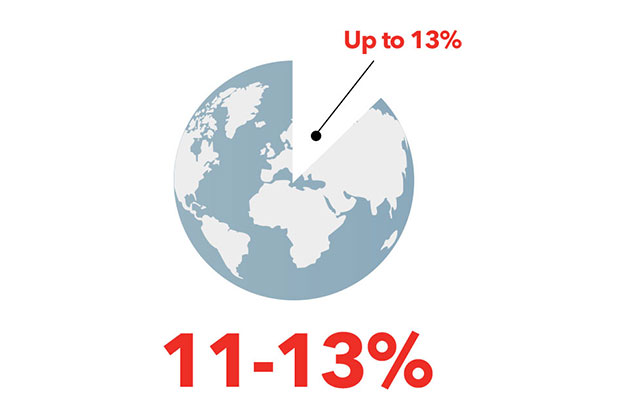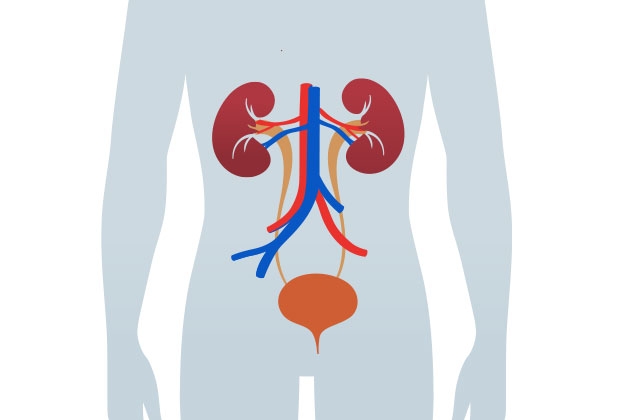CKD is a global health issue1
Chronic kidney disease (CKD) affects up to 13% of the global population.1 Being diagnosed with kidney disease can be a huge challenge, both for the patient and those people around them. Its diagnosis and management, particularly in advanced stages of kidney disease, can impact severely upon their physical and mental state.4

Global prevalence of CKD by stage
As shown in the graph, the estimated global CKD prevalence is between 11 and 13% with the majority of patients in stage 3.1 These results are in accordance with a more recent study by Obrador published in 2019.5

Understanding CKD - Kidney basics

You have two kidneys, each about the size of an adult fist, located on either side of the spine just below the rib cage. Although they are small, your kidneys perform many complex and vital functions that keep the rest of the body in balance, including elimination of wastes, regulation of blood composition, blood volume and blood pressure, as well as mineral homeostasis. When the kidneys are damaged or diseased, they can abruptly or progressively lose their ability to perform these vital functions. This results in waste and fluid build-up and abnormal hormonal regulation of blood pressure and mineral homeostasis.
The kidneys regulate:2

Waste elimination

Blood composition

Blood volume

Blood pressure

Mineral homeostasis
Definition of chronic kidney disease3
Chronic kidney disease describes the gradual loss of kidney function. According to the KDIGO 2017 Clinical Practice Guideline, CKD is defined as abnormalities of kidney structure or function, present for more than 3 months, with implications for health. Chronic kidney disease includes conditions that damage your kidneys and decrease their ability to keep you healthy. If kidney disease gets worse, wastes can build to high levels in your blood and make you feel sick. You may develop complications like high blood pressure, anemia (low blood count), weak bones, poor nutritional health and nerve damage. Also, kidney disease increases your risk of having heart and blood vessel disease.
Stages of CKD
based on glomerular filtration rate (GFR)3
The KDIGO 2017 Clinical Practice Guideline suggests the classification of chronic kidney disease into five stages, based on glomerular filtration rate (or GFR), which is one of the measures of kidney function that describes the flow rate of filtered fluid through the kidney. This measure tells you how much kidney function you have. As kidney disease gets worse, the GFR number goes down.

Talk to your doctor
If you have been diagnosed with CKD it is likely that you will have regular follow up appointments with your doctor to check how you are feeling and to monitor the progress of your symptoms. If you have been feeling fatigued or think you may have any of the symptoms of iron deficiency such as paleness, faintness or a racing heart, you may want to speak to your doctor about your symptoms. To get the most out of your visit, think in advance about the information that the doctor might need in order to work out what is causing your symptoms. You should also prepare any questions that you want to ask.
HQ-NA-2100201. Date of preparation September 2021
- Hill NR, et al. PLoS One. 2016;11(7):e0158765
- https://www.kidney.org/kidneydisease/howkidneyswrk date of access August 2020
- Levey AS, et al. Kidney Int. 2005;67(6):2089-2100
- Kefale B, Alebachew M, Tadesse Y, Engidawork E (2019) Quality of life and its predictors among patients with chronic kidney disease: A hospital-based cross sectional study.PLoS ONE 14(2): e0212184.
- Obrador GT. Epidemiology of chronic kidney disease. UpToDate. 2019
如果您被诊断出患有慢性肾脏疾病(通常称为CKD),那么您患贫血的几率增加。缺铁可能在这种贫血中发挥作用。
缺铁的主要症状之一是疲乏——一种极度的疲倦。如果您正在出现疲乏,那么您可能感到身心俱疲,即使您没有做过任何特别累人的体力活动也是如此。
如果您已被诊断出患有CKD,那么您将可能与您的医生定期进行随访约诊,以检查您的感觉和监测您的症状的进展。如果您一直感到疲乏,或者有任何缺铁症状,例如苍白、感觉头晕或者心跳加速,那么您可能想要预约额外的就诊,或者在您的下次计划就诊中向您的医生咨询您的症状。为了最大限度地利用您的访视,事先思考医生可能需要的信息,以便找出引起您的症状的原因。您也应该准备好任何您想问的问题。
一旦您的医生检测了您的铁含量,他们就能决定最适合您的治疗。这将取决于您缺铁的程度,可以是建议如何从您的饮食中获得更多的铁和/或推荐您可使用的药物来改善您的铁水平。
如果您被诊断出患有慢性肾脏疾病(通常称为CKD),那么您患贫血的几率增加。缺铁可能在这种贫血中发挥作用。
缺铁的主要症状之一是疲乏——一种极度的疲倦。如果您正在出现疲乏,那么您可能感到身心俱疲,即使您没有做过任何特别累人的体力活动也是如此。
如果您已被诊断出患有CKD,那么您将可能与您的医生定期进行随访约诊,以检查您的感觉和监测您的症状的进展。如果您一直感到疲乏,或者有任何缺铁症状,例如苍白、感觉头晕或者心跳加速,那么您可能想要预约额外的就诊,或者在您的下次计划就诊中向您的医生咨询您的症状。为了最大限度地利用您的访视,事先思考医生可能需要的信息,以便找出引起您的症状的原因。您也应该准备好任何您想问的问题。
一旦您的医生检测了您的铁含量,他们就能决定最适合您的治疗。这将取决于您缺铁的程度,可以是建议如何从您的饮食中获得更多的铁和/或推荐您可使用的药物来改善您的铁水平。




